|
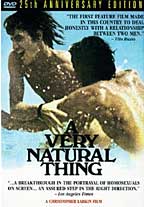
A
Very Natural Thing
Waterbearer
Films,
1974
Director:
Christopher Larkin
Screenplay:
Joseph Coencas,
Christopher Larkin
Starring:
Robert Joel,
Curt Gareth,
Bo White,
Anthony McKay
Howard Blakey,
Jay Pierce,
Robert Grill
Rated
R, 80 minutes
|
That
70's Show
by
Michael D. Klemm
Posted online November, 2010
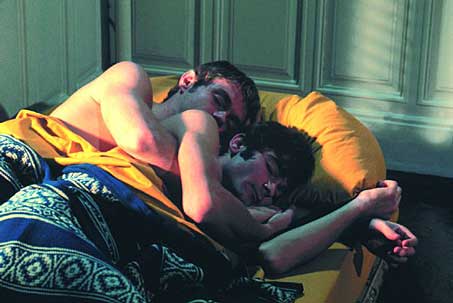
M. Faust,
a fellow film critic who writes for Buffalo's ArtVoice
Magazine, told me something that has always stuck with me. Faust was once
the owner of Mondo Video, the only video store in Buffalo where you could
find really obscure indie and foreign films. (A good chunk of the queer
films that I reviewed in the late 1990s were rented at Mondo.) Amongst
the films in his eclectic inventory was an early 60s soft porn movie that
featured Yoko Ono. He considered the film to be an important document
because it preserved on celluloid a Manhattan setting that is now a very
distant memory. The same thing can be said about 1974's A
Very Natural Thing (directed by Christopher Larkin from
a screenplay by Larkin and Joseph Coencas), one of the first positive
American films about homosexuality. Aside from offering a groundbreaking
story about two men struggling to maintain a relationship, it also documents,
for posterity, a period of pre-AIDS gay liberation that is but a hazy
recollection now for an entire generation.
I plan
to discuss why this title is important and place it in its historical
context. Warning, there will be spoilers ahead.
|
|
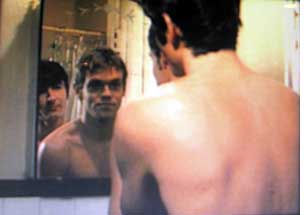 Robert
Joel stars as David, a young gay man who has rejected life as a monk in
a monastery and embraced the sexuality he once sought to suppress. He
is now an English teacher, teaching Shakespeare's sonnets to a class of
bored high school students. His lover is Mark (Curt Gareth), a straight
acting business executive. These two men are hot for each other but they
have drastically different ideas about their relationship. David wants
love, marriage and apple pie. Mark tells David that he's a "pretty good
fuck for an ex-monk" and that he's "flattered" that David wants to include
him in his "fairy tale world," but he thinks romance and marriage went
out in the 50s. "I'm liberated," he insists, "I'm not as traditional as
you." Robert
Joel stars as David, a young gay man who has rejected life as a monk in
a monastery and embraced the sexuality he once sought to suppress. He
is now an English teacher, teaching Shakespeare's sonnets to a class of
bored high school students. His lover is Mark (Curt Gareth), a straight
acting business executive. These two men are hot for each other but they
have drastically different ideas about their relationship. David wants
love, marriage and apple pie. Mark tells David that he's a "pretty good
fuck for an ex-monk" and that he's "flattered" that David wants to include
him in his "fairy tale world," but he thinks romance and marriage went
out in the 50s. "I'm liberated," he insists, "I'm not as traditional as
you."
|
|
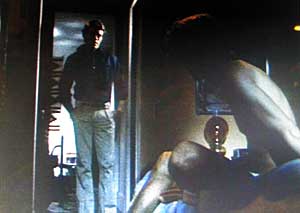 Societal
pressures aside, these guys are comfortable with being gay, they just
aren't jelling as a couple. "Do we have to do everything together?"
Mark asks. He mocks David's old fashioned ideas and enjoys other men on
the side. David, in an effort to salvage their relationship, agrees to
experiment with him. Participating in an orgy on Fire Island proves disastrous
and the two men wind up going their separate ways. After feeling unsatisfied
on a solo trip to the baths, David meets Jason (Bo White), a divorced
photographer, at one of the first Gay Pride Parades. The two men hit it
off but David isn't ready to leap into another relationship unless he
knows it's a sure thing. They agree to just enjoy each other's company,
and the film ends with a slow motion, naked romp in the surf at Cape Cod. Societal
pressures aside, these guys are comfortable with being gay, they just
aren't jelling as a couple. "Do we have to do everything together?"
Mark asks. He mocks David's old fashioned ideas and enjoys other men on
the side. David, in an effort to salvage their relationship, agrees to
experiment with him. Participating in an orgy on Fire Island proves disastrous
and the two men wind up going their separate ways. After feeling unsatisfied
on a solo trip to the baths, David meets Jason (Bo White), a divorced
photographer, at one of the first Gay Pride Parades. The two men hit it
off but David isn't ready to leap into another relationship unless he
knows it's a sure thing. They agree to just enjoy each other's company,
and the film ends with a slow motion, naked romp in the surf at Cape Cod.
|
|
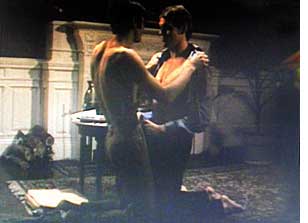 Even
though the film screams 1970s, A Very Natural
Thing (originally titled For As Long As Possible)
is surprisingly unapologetic for its day. Both men, though closeted in
their jobs, are not having self loathing coming out issues like most of
the cast of 1970's The
Boys In The Band. Mark has been out since prep school where he
dated, and slept with, women until he discovered that he preferred the
company of men. David became a monk to curb his urges but the experience
"left a bad taste in [his] mouth about God, like He's either sadistic
or incompetent." Though tame by today's standards, A
Very Natural Thing was quite a gutsy film. There is full
frontal nudity, kissing, and a few sex scenes. I loved a throwaway moment
where they buy a tube of KY Jelly and the pharmacist gives them a dirty
look. The orgy and the trip to the baths are explicit for 1974 but not
quite porn. (Gay porn already existed at this point, Wakefield Poole's
1971 The Boys In The Sand is the most famous example.) Audiences
were not used to seeing men being romantic together on the screen and
these guys enjoy many intimate moments. Even
though the film screams 1970s, A Very Natural
Thing (originally titled For As Long As Possible)
is surprisingly unapologetic for its day. Both men, though closeted in
their jobs, are not having self loathing coming out issues like most of
the cast of 1970's The
Boys In The Band. Mark has been out since prep school where he
dated, and slept with, women until he discovered that he preferred the
company of men. David became a monk to curb his urges but the experience
"left a bad taste in [his] mouth about God, like He's either sadistic
or incompetent." Though tame by today's standards, A
Very Natural Thing was quite a gutsy film. There is full
frontal nudity, kissing, and a few sex scenes. I loved a throwaway moment
where they buy a tube of KY Jelly and the pharmacist gives them a dirty
look. The orgy and the trip to the baths are explicit for 1974 but not
quite porn. (Gay porn already existed at this point, Wakefield Poole's
1971 The Boys In The Sand is the most famous example.) Audiences
were not used to seeing men being romantic together on the screen and
these guys enjoy many intimate moments.
|
|
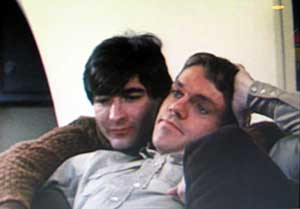 A
Very Natural Thing,
was savaged by the few mainstream critics who bothered to review it. The
film was dismissed as a gay version of 1970's Love Story and mocked
for recycling the same standard Hollywood romance cliches. A cute montage
sequence that depicts our lovers rolling in Autumn leaves and riding a
carousel reinforce this notion but methinks the director was invoking
parody here to mock Tinseltown traditions. Am I apologizing for sloppy
filmmaking? No, I don't think so, because Mark actually refers to David
as Love Story's Ali McGraw, and he also references that same film's
cheesy tagline ("Love means never having to say you're sorry") when he
says "Love means never having to say you're in love." A
Very Natural Thing,
was savaged by the few mainstream critics who bothered to review it. The
film was dismissed as a gay version of 1970's Love Story and mocked
for recycling the same standard Hollywood romance cliches. A cute montage
sequence that depicts our lovers rolling in Autumn leaves and riding a
carousel reinforce this notion but methinks the director was invoking
parody here to mock Tinseltown traditions. Am I apologizing for sloppy
filmmaking? No, I don't think so, because Mark actually refers to David
as Love Story's Ali McGraw, and he also references that same film's
cheesy tagline ("Love means never having to say you're sorry") when he
says "Love means never having to say you're in love."
|
|
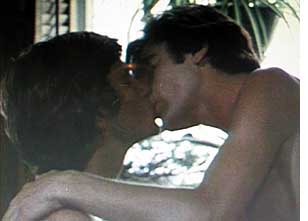 The
film was similarly dismissed by much of its target audience. We were in
the throes of a sexual revolution in the early 70s and hip gay men who
wanted sexual liberation found David's quest for romantic love and monogamy
to be outdated and square. Audiences disagreed with the film's politics
and undoubtedly felt that the director was on the side of the romantics.
As if to confirm this, David's trek through the baths is accompanied by
ominous music and the scene looks like Night Of The Living Dead.
Mark is also clearly the bad guy in the relationship. Ironically, this
very theme makes A Very Natural Thing
still appear modern and contemporary (despite the clothes and the hair).
The debate over fidelity vs. an open marriage still rages today and remains
a standard dramatic device in much of queer cinema. Another familiar debate
was first articulated on film here. David doesn't think marching in a
Gay Pride Parade is going to change people's minds about faggots. Being
truthful about his personal life could compromise his job as a teacher
but his new beau, Jason, insists that we need to be out so that someday
future gays won't have to hide. The
film was similarly dismissed by much of its target audience. We were in
the throes of a sexual revolution in the early 70s and hip gay men who
wanted sexual liberation found David's quest for romantic love and monogamy
to be outdated and square. Audiences disagreed with the film's politics
and undoubtedly felt that the director was on the side of the romantics.
As if to confirm this, David's trek through the baths is accompanied by
ominous music and the scene looks like Night Of The Living Dead.
Mark is also clearly the bad guy in the relationship. Ironically, this
very theme makes A Very Natural Thing
still appear modern and contemporary (despite the clothes and the hair).
The debate over fidelity vs. an open marriage still rages today and remains
a standard dramatic device in much of queer cinema. Another familiar debate
was first articulated on film here. David doesn't think marching in a
Gay Pride Parade is going to change people's minds about faggots. Being
truthful about his personal life could compromise his job as a teacher
but his new beau, Jason, insists that we need to be out so that someday
future gays won't have to hide.
|
|
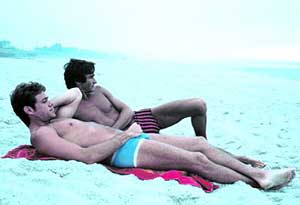 Gay
films were a rarity in 1974 and director Larkin, knowing that his film
was a milestone of sorts, threw everything but the kitchen sink into his
opus. Some of his elements are disruptive to the narrative but remain
important as documentary. He begins the film by cutting the Pride March,
and interviews with the participants, with David's de-frocking at the
monastery. More of these talking heads return (along with the parade)
in a segue leading up to David's meeting with Jason at the Christopher
Street Pride celebration. Though these interview sound bites stop the
narrative dead, it's poignant to hear what they have to say because we
realize that, for all our gains, some things still haven't changed. Gay
films were a rarity in 1974 and director Larkin, knowing that his film
was a milestone of sorts, threw everything but the kitchen sink into his
opus. Some of his elements are disruptive to the narrative but remain
important as documentary. He begins the film by cutting the Pride March,
and interviews with the participants, with David's de-frocking at the
monastery. More of these talking heads return (along with the parade)
in a segue leading up to David's meeting with Jason at the Christopher
Street Pride celebration. Though these interview sound bites stop the
narrative dead, it's poignant to hear what they have to say because we
realize that, for all our gains, some things still haven't changed.
|
|
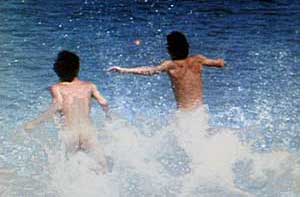 Another
"first" presented here was a happy ending in a queer film. David and Mark
might not last as a couple but David appears to have a future with Jason.
They come to an understanding over wanting to be together rather
than having to be. No one commits suicide, no one has a tree fall
on them, and no one says "Show me a happy homosexual and I'll show you
a gay corpse" like Michael, the poster child for whining, at the end of
The Boys In The
Band. Instead we see liberation as a slow motion beach frolic
that is lyrical and beautiful even if it goes on for a bit too long. Another
"first" presented here was a happy ending in a queer film. David and Mark
might not last as a couple but David appears to have a future with Jason.
They come to an understanding over wanting to be together rather
than having to be. No one commits suicide, no one has a tree fall
on them, and no one says "Show me a happy homosexual and I'll show you
a gay corpse" like Michael, the poster child for whining, at the end of
The Boys In The
Band. Instead we see liberation as a slow motion beach frolic
that is lyrical and beautiful even if it goes on for a bit too long.
|
|
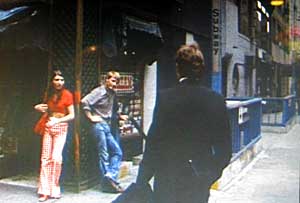 For
all its good intentions, A Very Natural Thing
will be remembered more as a political act than as a polished work of
classic cinema. The cinematography is, at best, adequate. It is often
too dark (especially the scene at the baths, though some of this may be
attributed to the film's age and the lack of restoration). Some of the
dialogue is a tad stiff too. Modern audiences will need to forgive a few
shortcomings but there is also much to savor. As noted earlier, the film
documents a bygone age and we are treated to the era's gay bars, the historic
baths, Fire Island and the 1973 parade. A few nicely constructed scenes
stand out. I loved the wordless interlude when a woman on the street thinks
that Mark is cruising her until he comically walks away with the man standing
next to her instead. At one point, the audience is deceived into thinking
that David and Mark are getting married but then the camera pulls back
to reveal that they are attending a straight friend's wedding. The marriage
vows continue on the soundtrack, providing ironic commentary while we
watch David move into Mark's apartment. One of the most striking cinematic
moments occurs at the orgy when David's frightened face disappears under
a sea of naked men. For
all its good intentions, A Very Natural Thing
will be remembered more as a political act than as a polished work of
classic cinema. The cinematography is, at best, adequate. It is often
too dark (especially the scene at the baths, though some of this may be
attributed to the film's age and the lack of restoration). Some of the
dialogue is a tad stiff too. Modern audiences will need to forgive a few
shortcomings but there is also much to savor. As noted earlier, the film
documents a bygone age and we are treated to the era's gay bars, the historic
baths, Fire Island and the 1973 parade. A few nicely constructed scenes
stand out. I loved the wordless interlude when a woman on the street thinks
that Mark is cruising her until he comically walks away with the man standing
next to her instead. At one point, the audience is deceived into thinking
that David and Mark are getting married but then the camera pulls back
to reveal that they are attending a straight friend's wedding. The marriage
vows continue on the soundtrack, providing ironic commentary while we
watch David move into Mark's apartment. One of the most striking cinematic
moments occurs at the orgy when David's frightened face disappears under
a sea of naked men.
Gay
historians and film buffs might recognize a very young Vito
Russo when he appears briefly at a party on Fire Island.
|
|
Most
of the historical information on the film I was able to find comes from
Russo's The Celluloid Closet
and from a Wikipedia article. It appears that parts of the script are
autobiographical; I had thought that David being an ex-monk was an odd
plot detail, but online accounts reveal that Larkin himself spent several
years in a monastery before he came out. In the 80s, he was known as Purisha
Androgyne Larkin and became a sexual guru of sorts. His spiritual philosophies
about fisting can be found in an interview in Mark Thompson's book, Leatherfolk:
Radical Sex, People, Politics, And Practice. His experiences as a
"radical-sex shaman" were reported in his book, The Divine Androgyne
According to Purusha. Larkin spent the last two years of his life
battling AIDS and he committed suicide in 1988. He was 54.
In
closing, the execution might not always live up to the director's ambitions
but A Very Natural Thing remains
a very important title in the queer cinema canon; a trailblazer that set
the stage for many films to come.
Other
1970s gay films on Cinemaqueer.com:
The Boys In The
Band (1970)
Fox And His Friends
(1975
The Naked Civil Servant (1975)
The Rocky Horror Picture
Show (1975
Saturday Night
At The Baths (1976)
Johan: Mon ete 75
(1975)
The Consequence
(1977)
In A Year Of Thirteen Moons
(1978)
La Cage Aux Folles
(1978)
Nighthawks (1978)
We Were One Man (1979)
Cruising (1980)
|

